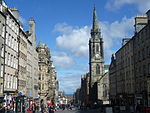St Cecilia's Hall

St Cecilia's Hall is a small concert hall and museum in the city of Edinburgh, Scotland, in the United Kingdom. It is on the corner of Niddry Street and the Cowgate, about 168 metres (551 ft) south of the Royal Mile. The hall dates from 1763 and was the first purpose-built concert hall in Scotland. It is a Category A listed building.The University of Edinburgh owns the hall, which houses a public exhibition of highlights from the University's Musical Instrument Collection. The Russell and Mirrey Collections of keyboard instruments, the Anne Macaulay Collection of Stringed instruments, and the Shackleton Collection of wind instruments, primarily clarinets, are among the component collections. It is used for concerts presenting music from various traditions, as well as a venue for the Edinburgh International Festival and the Festival Fringe during the summer.
Excerpt from the Wikipedia article St Cecilia's Hall (License: CC BY-SA 3.0, Authors, Images).St Cecilia's Hall
Niddry Street, City of Edinburgh Old Town
Geographical coordinates (GPS) Address External links Nearby Places Show on map
Geographical coordinates (GPS)
| Latitude | Longitude |
|---|---|
| N 55.949 ° | E -3.1865 ° |
Address
St Cecilia's Hall
Niddry Street
EH1 1LG City of Edinburgh, Old Town
Scotland, United Kingdom
Open on Google Maps










